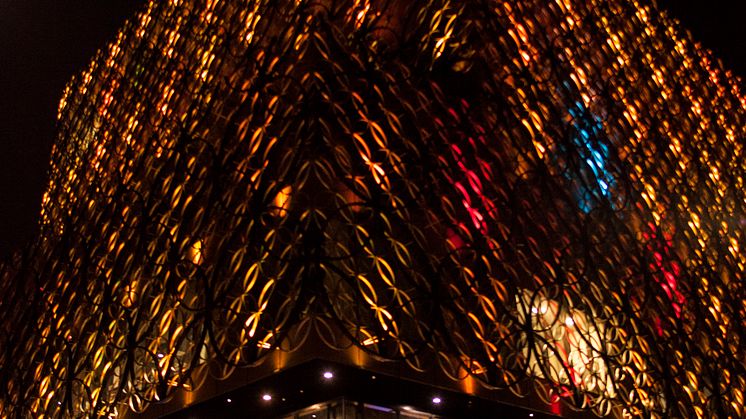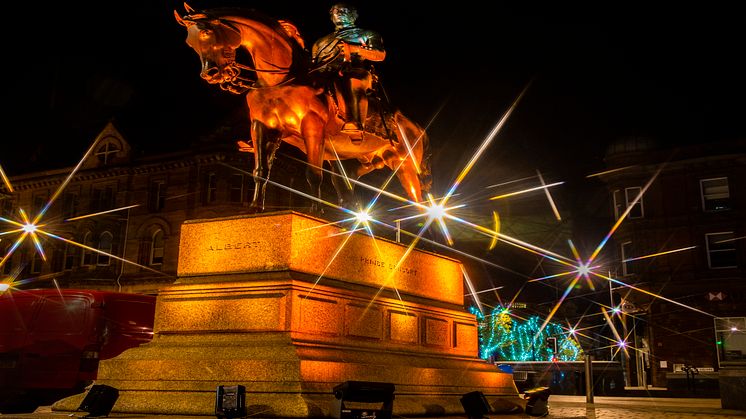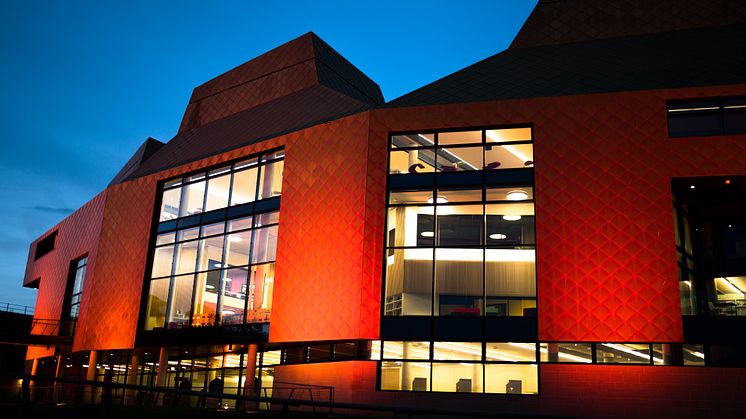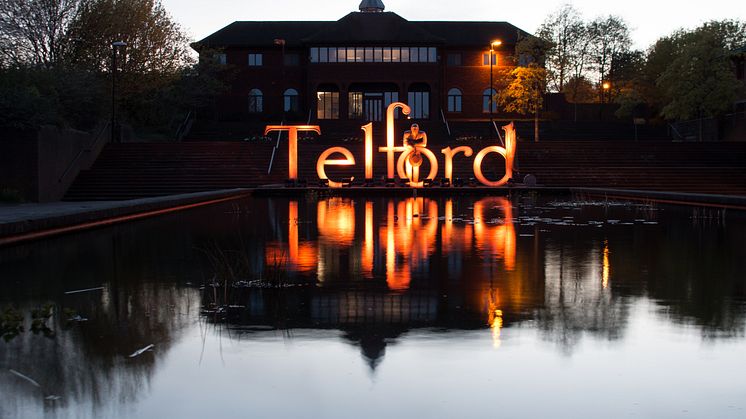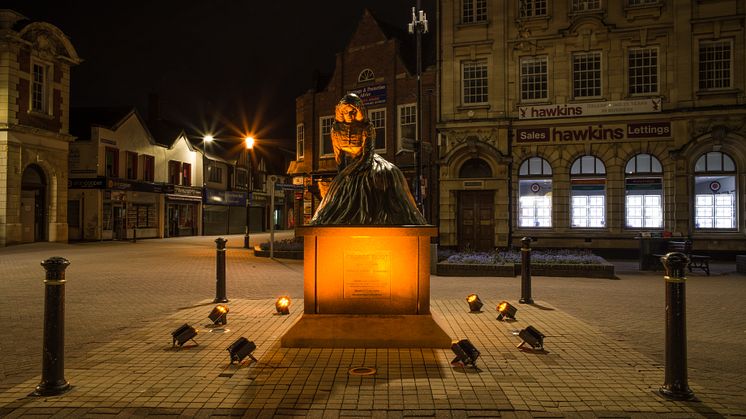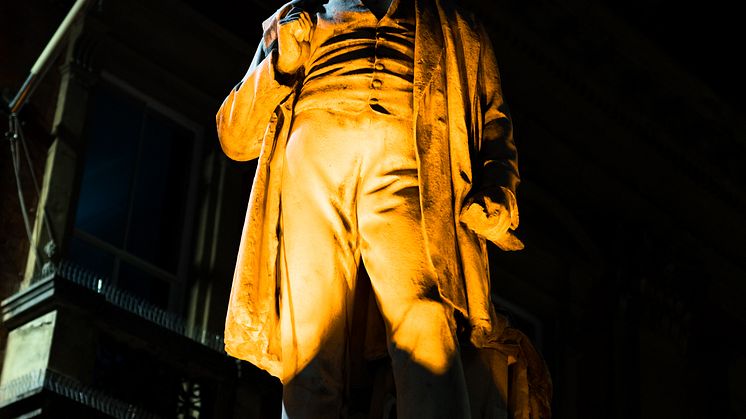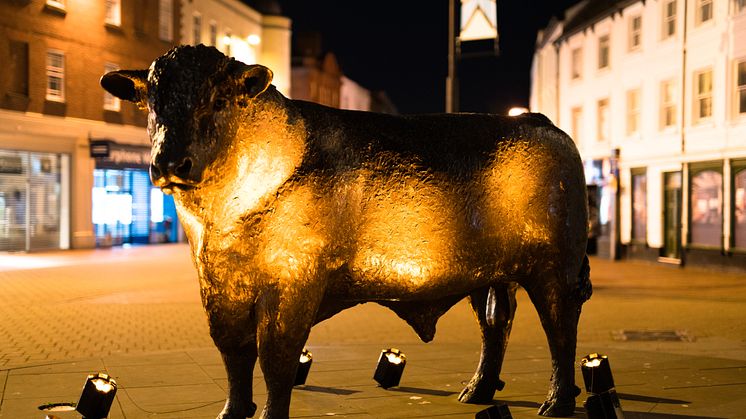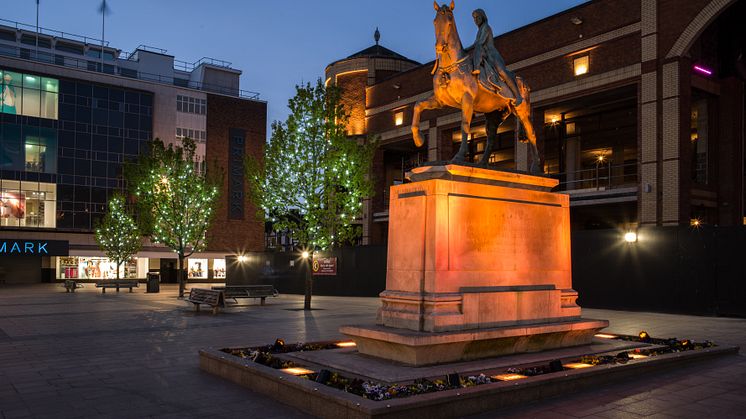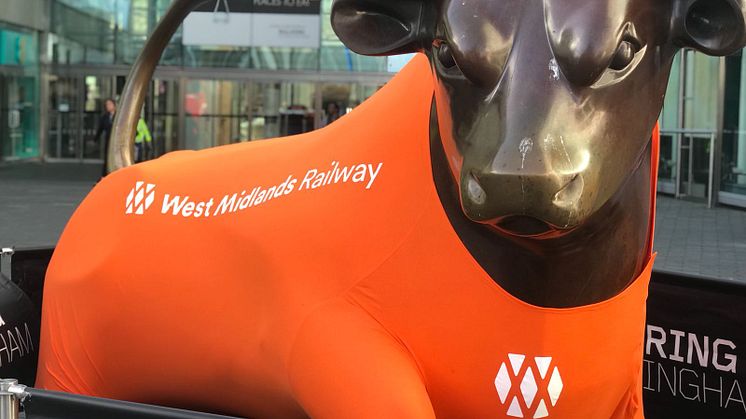
Press release -
West Midlands Railway lights up the region
- The train operator turns the region’s most iconic landmarks orange
- Up to £1bn investment announced for improved local connectivity
West Midlands Railway (WMR) has lit up famous landmarks across the Midlands in its distinctive orange to further showcase its commitment to transforming rail travel across the region.
Iconic monuments in Birmingham, including Library of Birmingham and Bull at Bullring, were illuminated or wrapped in WMR’s recognisable brand colour to remind passengers of its robust railway links across the Midlands. Other key landmarks, such as Coventry’s Lady Godiva statue and the New Art Gallery in Walsall, were also lit up in orange during the takeover.
As a railway service managed locally for local residents, the regional takeover marks a move for WMR to embed itself into the heart of the Midlands community. The increasingly-devolved services available to passengers will aim to establish WMR as the go-to network for travel, whether it’s for work purposes or leisure.
Since taking over the franchise in December 2017, West Midlands Trains, the company behind West Midlands Railway, has unveiled an investment package of £1 billion.
This includes £700 million investment in new and refurbished trains; £70 million into new and existing depots to improve train reliability; 20,000 extra seats for rush hour passengers in Birmingham and standing room for 50,000 more commuters in new, metro style carriages.
Additionally, passengers across the region will benefit from more late night and Sunday services and more services to London from Walsall and Wolverhampton.
Andy Street, Mayor of West Midlands, commented: “In the months and years ahead, passengers in the West Midlands will see significant changes as a result of us having a truly regional rail franchise.
“As well as the investment in more trains, new stations and new metro style carriages, people will become more aware of the brand identity as we continue our public transport revolution.
“We are gradually moving towards shared West Midlands identity for the different modes of transport - rail, buses and cycling - integrated together, as has been the case in London for some time."
Richard Brooks, customer experience director at West Midlands Railway, said: “We’re proud to continue to drive change as the West Midlands’ dedicated railway operator. Turning the region orange is our way of showing residents our pledge to continue upgrading railway services, while fuelling and feeding the West Midlands economy through continued investment.
“Collaboration will be essential going forward and we’re lucky to have so many stakeholders within the region who share the same vision of a transport brand especially for the West Midlands.
“We aim to provide the best journey experience for all of our customers, so we’re excited to continue our work in transforming railway services and creating a brand that we all can really be proud of.”
To celebrate the regional light up, morning commuters will be greeted on Friday, 27 April with coffee cups and redeemable coffee vouchers between 6.30am and 11.00am at station platforms across the network.
Topics
Categories
Regions
Notes to editors:
West Midlands Railway is turning iconic locations across the region orange to match in with the operator’s distinctive orange branding.
Sites illuminated or dressed in WMR’s colour can be found below:
●Library of Birmingham
●Birmingham Bull @ Bullring
●Worcester The Hive
●Kidderminster Sir Rowland Hill Statue
●Lichfield Clock Tower
●Coventry Lady Godiva Statue
●The New Art Gallery in Walsall
●Telford Thomas Telford Statue
●Shrewsbury Lord Hill Column
●Hereford Bull Statue
●Leamington Spa Queen Victoria Statue
●Stratford upon Avon Jester Statue
●Nuneaton George Eliot Memorial Statue
●Wolverhampton Man on the Horse
For further information on West Midlands Trains, London Northwestern Railway or West Midlands Railway call our newsroom on 03300 955150.
About West Midlands Trains
West Midlands Trains Ltd. will be running the West Midlands rail franchise from 10 December 2017 until 2025/6. Abellio has a 70.1% share of the company, East Japan Railway Company (JRE) and Mitsui & Co., Ltd. (Mitsui) own the remaining 29.9% in a 50:50 split.
About Abellio
Abellio is the international passenger transport subsidiary of the Dutch national railway company, Nederlandse Spoorwegen. Every day our people provide rail, bus and tram services to 1.7m customers across the UK, Germany and in the Netherlands. In the UK we operate buses through Abellio London, as well as ScotRail and Greater Anglia train services, and Merseyrail in a joint venture with Serco. In Germany we operate Abellio Deutschland, serving communities in North Rhine Westfalia, Saxony, Lower Saxony, Saxony-Anhalt, Hesse and Thuringia. Our role in transport extends beyond the journey from a-to-b. With our international heritage and our policy of sharing best practice, not just amongst ourselves, but across the wider transport industry, we provide thought leadership and truly innovative ideas which make a positive contribution to the communities we serve. For more information on Abellio visit www.abellio.com
About Mitsui
Mitsui is one of the most diversified and comprehensive trading, investment and service enterprises in the world with 139 offices in 66 countries as of March, 2017. Utilising our global operating locations, network and information resources, we are multilaterally pursuing business that ranges from product sales, worldwide logistics and financing, through to the development of major international infrastructure and other projects in the following fields: Iron & Steel Products, Mineral & Metal Resources, Infrastructure Projects, Integrated Transportation Systems, Chemicals, Energy, Food Resources, Food Products & Services, Consumer Services, IT & Communication, and Corporate Development Business. Mitsui is actively taking on challenges for global business innovation around the world. For more information, visit www.mitsui.com.
About JR East
East Japan Railway Company (JR East) was established in 1987, when Japanese National Railways was divided as part of a package of railway reforms. JR East’s railway business covers a 7,500 km (approx. 4,660 miles) network in the eastern part of the Japanese main island, including Tokyo Metropolitan area, and provides transportation services, comprising urban, suburban and high speed operations, for 17 million passengers on a daily basis. JR East also undertakes non‐transport commercial activities, which account for more than 30% of the total revenue of JR East Group. JR East contributes to passengers and communities it serves by delivering high degrees of punctuality, reliability and comfort and also continues to pursue higher levels of safety and service quality through technical innovation. For more information, visit www.jreast.co.jp/e.


